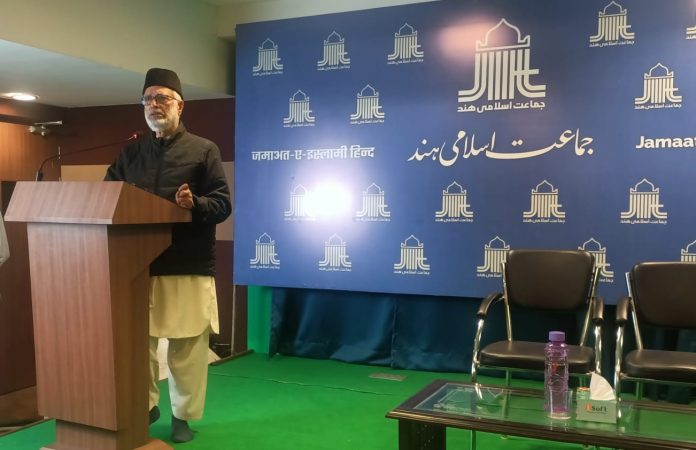New Delhi: Dr. Hasan Raza, Director of Indian Institute of Islamic Studies and Research, addressed the pressing challenges faced by the nation and emphasised the critical need for a comprehensive educational policy and political maturity in a democratic setup.
Speaking on the current scenario, Dr. Raza urged the community to draw inspiration from the educational vision of Maulana Maududi and Maulana Abdul Kalam Azad. He encouraged a close examination of Jamaat-e-Islami Hind’s latest four-year term plan, which outlines a roadmap to tackle the community’s pressing issues and provides actionable guidelines. Stressing the importance of solutions over discussions, Dr. Raza highlighted the necessity of pragmatic strategies within the democratic framework.
On the international front, Dr. Raza expressed concern over the looming threat of a third world war, stating, “Nationally and internationally, we are at a critical juncture. Seven decades post-Independence, we find ourselves in a delicate situation. Rapid transformations are reshaping the global and national landscapes. Failing to adapt to these shifts could lead to irreversible consequences, akin to the painful aftermath of partition.”
Addressing domestic challenges, Dr. Raza observed the resurgence of divisive narratives by Hindutva forces. He noted, “India is undergoing significant transformations. Following their underwhelming performance in the last Lok Sabha elections, these forces are reviving issues like mosque controversies, aiming to replicate the political gains achieved during the Babri Masjid dispute. This is their strategy in view of the centenary of the RSS and general elections 2027.”
Dr. Raza reiterated the importance of education and political acumen, referencing Maulana Maududi’s vision. “A community that lacks a robust educational framework and political wisdom is destined to falter. We need an educational policy that not only strengthens our community but also resonates with contemporary perspectives. Developing a comprehensive Milli Educational Policy is the need of the hour,” he asserted.
He also pointed out the lack of awareness among Muslims about the dynamics of a democratic state, stressing the need for a unified strategy in electoral and non-electoral politics. “Every community in India, except Muslims, has established platforms that shape narratives and goals for their collective benefit. This gap must be addressed urgently,” he added.
On political maturity, Dr. Raza highlighted the need for a democratic, inclusive approach. “In a democracy, representation must be equal, and our political narrative should be inclusive, not community-centric, to avoid being labelled as communal. Muslims must align their strategies with the principles of democracy and evolve accordingly,” he emphasised.




